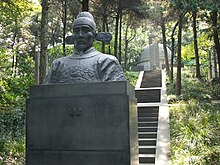Fang Xiaoru
Fang Xiaoru | |
|---|---|
 | |
| Born | 1357 |
| Died | 25 July 1402 |
| Cause of death | Disputed (according to one account, Fang was executed by waist severing during China's only instance of an extermination of the ten degrees of kinship) |
Fang Xiaoru (Chinese: 方孝孺; pinyin: Fāng Xìaorú; 1357 – 25 July 1402), courtesy name Xizhi (希直) or Xigu (希古), a native of Ninghai County, Zhejiang (present-day Ningbo, Zhejiang), was a Chinese official and Confucian scholar of the Ming dynasty. He was an orthodox Confucian scholar-bureaucrat, famous for his continuation of the Jinhua school of Zhu Xi and later for his loyalty to the former Jianwen Emperor (Zhu Yunwen), who died in the rebellion of the Prince of Yan (Jingnan rebellion).[1][2][3][4]
Life
[edit]During the Jingnan rebellion, Fang served as one of the Jianwen Emperor's closest advisors.
He was famed for his connection to Song Lian and the scholars of the Jinhua school as well as for his own talent and lucid composition.
After Zhu Di, the Prince of Yan, usurped the throne to become the Yongle Emperor in 1402, Fang Xiaoru refused to serve the new Emperor and was put to death at the age of 46.
Death
[edit]There are several different accounts of Fang's death. The official History of Ming, compiled by Qing-era scholars, records that the Yongle Emperor summoned Fang Xiaoru, and demanded Fang write an inaugural address that would compare his usurpation of the throne with the regency of the Duke of Zhou during the reign of his nephew King Cheng of Zhou in ancient China. Fang asked, "Then where is King Cheng?" Zhu replied, "He was killed by his own fire." Fang continued to press the issue, asking Zhu, "Why not enthrone King Cheng's son?" Zhu answered, "The country requires a mature ruler." Fang again asked, "What about the Emperor's brother?" Zhu answered: "That is my family matter. The address must be written by you." Fang threw his pen on the ground and refused to write the address. He was executed by lingchi (磔), and several of his family members lost their lives.[5]
Another account, found in the 17th century text, Annals of Ming History, records a similar exchange, but adds that Fang was threatened with the extermination of nine kinships. Fang then responded: "I would be fine with ten!" Thus, along with his extended family, many of his students and peers were arrested and executed as the "10th kinship". Altogether, 873 people are said to have been executed.[6]
The 19th century text, Comprehensive History of Ming, records an additional exchange: After the Emperor insisted on having Fang write an address, Fang picked up his pen and wrote on a paper the words "燕賊篡位" ("The Bandit of Yan usurped the throne."). The Emperor was furious and ordered his death.[7]
The second and third account are generally considered by historians to be apocryphal; it is speculated that they were invented posthumously by Chinese literati of later generations who sympathized with Fang.[8]
Legacy
[edit]People in Fujian (闽南人) regard Fang Xiaoru, along with Tie Xuan and Jing Qing (景清), as the Sanfu Qiansui (三府千岁; "three houses, a thousand years"), or Sanwang (三王; "three king"), deities in the Wang Ye worship (王爷神).
Gallery
[edit]-
Portrait of Fang Xiaoru by Ren Yourong (任有容) of the Qing dynasty
-
Tomb of Fang Xiaoru
References
[edit]- ^ Xinhuanet. ""骨鲠之士"方孝孺遭灭十族 正气还是迂腐? Archived 2011-07-20 at the Wayback Machine" (in Chinese)
- ^ "方孝儒生平 Archived 2011-09-02 at the Wayback Machine." (in Chinese)
- ^ Xinhuanet. "方孝孺故裏溪上方". (in Chinese)
- ^ Zhang Tingyu, History of Ming, Volume 141.《明史》(卷一百四十一):“方孝孺,字希直,一字希古,宁海人。父克勤,洪武中循吏,自有传。孝孺幼警敏,双眸炯炯,读书日盈寸,乡人目为“小韩子。”长从宋濂学,濂门下知名士皆出其下。先辈胡翰、苏伯衡亦自谓弗如。孝孺顾末视文艺,恒以明王道、致太平为己任。”
- ^ Zhang Tingyu, History of Ming, Volume 141.《明史》(卷一百四十一):“成祖降榻,勞曰:「先生毋自苦,予欲法周公輔成王耳。」孝孺曰:「成王安在?」成祖曰:「彼自焚死。」孝孺曰:「何不立成王之子?」成祖曰:「國賴長君。」孝孺曰:「何不立成王之弟?」成祖曰:「此朕家事。」顧左右授筆劄,曰:「詔天下,非先生草不可」孝孺投筆於地,且哭且罵曰:「死即死耳,詔不可草。」成祖怒,命磔諸市。孝孺慨然就死,作絕命詞曰:「天降亂離兮孰知其由,奸臣得計兮謀國用猶。忠臣發憤兮血淚交流,以此殉君兮抑又何求?鳴呼哀哉兮庶不我尤!」時年四十有六。”
- ^ Gu Yingtai, Annals of Ming History, Volume 18. 《明史纪事本末》(卷十八): “孝孺大批數字,擲筆於地,且哭且駡曰:「死即死耳,詔不可草。」文皇大聲曰:「汝安能遽死。即死,獨不顧九族乎?」孝孺曰:「便十族奈我何!」聲愈厲。文皇大怒,令以刀抉其口兩旁至兩耳,復錮之獄,大收其朋友門生。每收一人,輒示孝孺,孝孺不一顧,乃盡殺之,然後出孝孺,磔之聚寶門外。孝孺慷慨就戮,為絕命詞曰:「天降亂離兮孰知其由,奸臣得計兮謀國用猶。忠臣發憤兮血淚交流,以此殉君兮抑又何求。嗚呼哀哉,庶不我尤!」時年四十六。復詔收其妻鄭氏,妻與諸子皆先經死。悉燔削方氏墓。初,籍十族,每逮至,輒以示孝孺,孝孺執不從,乃及母族林彥清等、妻族鄭原吉等。九族既戮,亦皆不從,乃及朋友門生廖鏞、林嘉猷等為一族,並坐,然後詔磔於市,坐死者八百七十三人,謫戍絕徼死者不可勝計。”
- ^ Xie Xia, Comprehensive History of Ming, Volume 13. 《明通鑑》 (卷十三):“孝孺投筆,哭且詈曰:「死即死耳,詔不可草。」上曰:「獨不畏九族乎?」孝孺曰:「便十族,奈我何?」上猶欲強之,孝孺乃索筆大書「燕賊篡位」四字。上大怒,命磔諸市。”
- ^ 李谷悦, 2014. 方孝孺殉难事迹的叙事演化与 “诛十族” 说考. 史学月刊, (5), pp.37-47.







